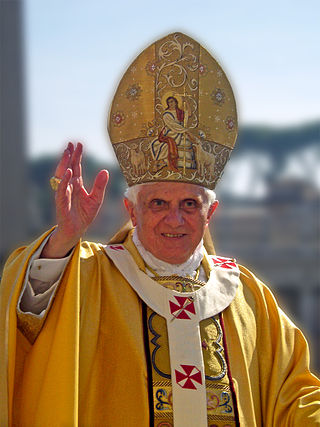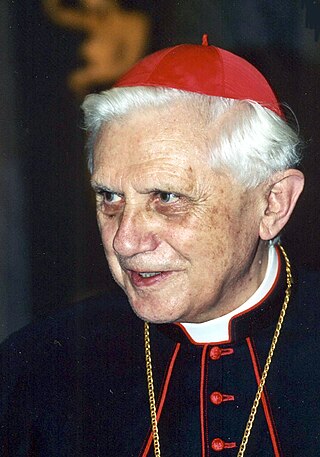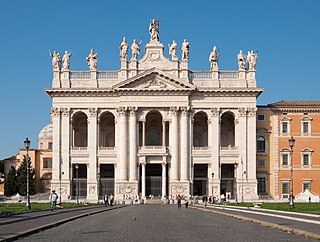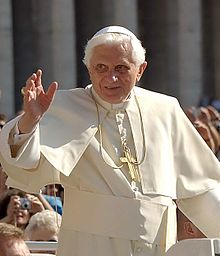Faith and rationality exist in varying degrees of conflict or compatibility. Rationality is based on reason or facts. Faith is belief in inspiration, revelation, or authority. The word faith sometimes refers to a belief that is held with lack of reason or evidence, a belief that is held in spite of or against reason or empirical evidence, or it can refer to belief based upon a degree of evidential warrant.

Pope Benedict XVI was the head of the Catholic Church and sovereign of the Vatican City State from 19 April 2005 until his resignation on 28 February 2013. Benedict's election as pope occurred in the 2005 papal conclave that followed the death of Pope John Paul II. Benedict chose to be known by the title "pope emeritus" upon his resignation, and he retained this title until his death in 2022.
Some Christian theologians embrace a holistic combination of Christian theology with some ideas of (ontological) materialism, a belief that matter is a fundamental substance of the world and that mental phenomena result from matter.
In Christianity, inculturation is the adaptation of Christian teachings and practices to cultures. This is a term that is generally used by Catholics, whereas Protestants, especially associated with the World Council of Churches, prefer to use the term "contextual theology".

Biblical inspiration is the doctrine in Christian theology that the human writers and canonizers of the Bible were led by God with the result that their writings may be designated in some sense the word of God. This belief is traditionally associated with concepts of the biblical infallibility and the internal consistency of the Bible.

The theology of Pope Benedict XVI, as promulgated during his pontificate, consists mainly of three encyclical letters on love (2005), hope (2007), and "charity in truth" (2009), as well as apostolic documents and various speeches and interviews. Benedict's theology underwent developments over the years, many of which were characterized by his leadership position in the Congregation for the Doctrine of the Faith, which is entrusted with preserving the Catholic faith in its entirety.

Deus caritas est, subtitled De Christiano Amore, is a 2005 encyclical, the first written by Pope Benedict XVI, in large part derived from writings by his late predecessor, Pope John Paul II. Its subject is love, as seen from a Christian perspective, and God's place within all love. Charity is one of the three theological virtues; and the other two were treated in two successive encyclicals, one signed by Benedict and one written substantially by him but signed by his successor Pope Francis . This text begins with a reflection on the forms of love known in Greek philosophy—eros, agape, philia (friendship)—and their relationship with the teachings of Jesus.

Joseph Ratzinger was named by Pope John Paul II on 25 November 1981 as prefect of the Congregation for the Doctrine of the Faith, formerly known as the Holy Office and, especially around the 16th century, as the Roman Inquisition.

The Regensburg lecture or Regensburg address was delivered on 12 September 2006 by Pope Benedict XVI at the University of Regensburg in Germany, which sparked international reactions and controversy. The lecture entitled "Faith, Reason and the University – Memories and Reflections".

John Christopher "Aidan" Nichols is an English academic and Catholic priest.

Paul Francis Knitter is an American theologian. He is currently an emeritus professor at Union Theological Seminary, where he has served as the Paul Tillich Professor of Theology, World Religions and Culture since 2007. He is also Emeritus Professor of Theology at Xavier University in Cincinnati, where he taught for 28 years before moving to Union. Knitter is known for his work on religious pluralism and multiple religious belonging, particularly regarding Buddhism and Christianity.
"A Common Word between Us and You" is an open letter, from October 13, 2007, from Muslim to Christian leaders. It calls for peace between Muslims and Christians and tries to work for common ground and understanding between both religions, in line with the Qur'anic command: "Say: 'O People of the Scripture! come to a common word as between us and you: that we worship none but God" and the Biblical commandment to love God, and one's neighbour. In 2008, the initiative was awarded the Eugen Biser Award, and the Building Bridges Award from the UK's Association of Muslim Social Scientists.

The Pope Benedict XVI bibliography contains a list of works by Pope Benedict XVI.
The post-Vatican II history of the Catholic Church is the recent history of the Catholic Church since the Second Vatican Council (1962–1965).

Pope Benedict XVI, who led the Roman Catholic Church as Pope from 2005 to 2013, continued manouevring the Church through the dynamics of modernity, which the Church had begun engaging in with the Second Vatican Council. Because the question of religious pluralism is a key issue raised by modernity, ecumenism, the establishment of harmony and dialogue between the different Christian denominations, is a significant concern of a post Second Vatican Council Church. Pope Benedict XVI's approach has been characterised as leaning toward the conservative while still being expansive and engaged, involving the full breadth of Christendom, including the Orthodox Churches and Protestant churches, as well as freshly engaging with other Christian bodies considered by Roman Catholics to be more heterodox, such as the Church of Jesus Christ of Latter-day Saints.

The Latin Church is the largest autonomous particular church within the Catholic Church, whose members constitute the vast majority of the 1.3 billion Christians in communion with the Pope in Rome. The Latin Church is one of 24 churches sui iuris in communion with the pope; the other 23 are referred to as the Eastern Catholic Churches, and have approximately 18 million members combined. The Latin Church traditionally employs the Latin liturgical rites, which since the mid-twentieth century are very often translated into the vernacular language. The predominant liturgical rite is the Roman Rite, elements of which have been practiced since the fourth century.
Models of Contextual Theology is a book written by Stephen B. Bevans which argues that all Christian theology is contextual and identifies six dominant models of contextual theology.

Criticism of Protestantism covers critiques and questions raised about Protestantism, the Christian denominations which arose out of the Protestant Reformation. While critics may praise some aspects of Protestantism which are not unique to the various forms of Protestantism, Protestantism is faced with criticism mainly from the Catholic Church and mainstream Eastern Orthodox churches, although Protestant denominations have also engaged in self-critique and criticized one another. According to both the Catholic Church and Eastern Orthodoxy, many major, foundational Protestant doctrines have been officially declared heretical.
Leslie Dewart was a Canadian philosopher and Professor Emeritus at the Graduate Department of Philosophy and the Centre for the Study of Religion at the University of Toronto.
Ludwig Weimer ( is a German theologian and priest of the Catholic Integrated Community.









